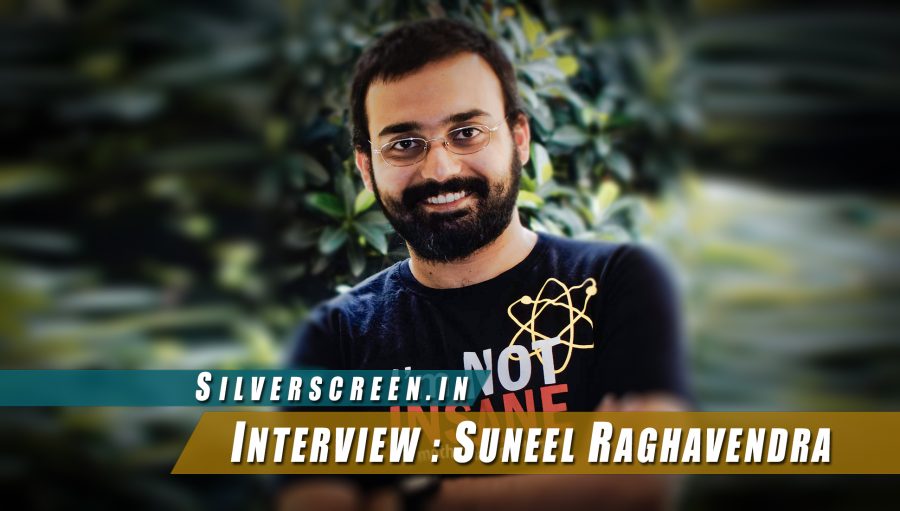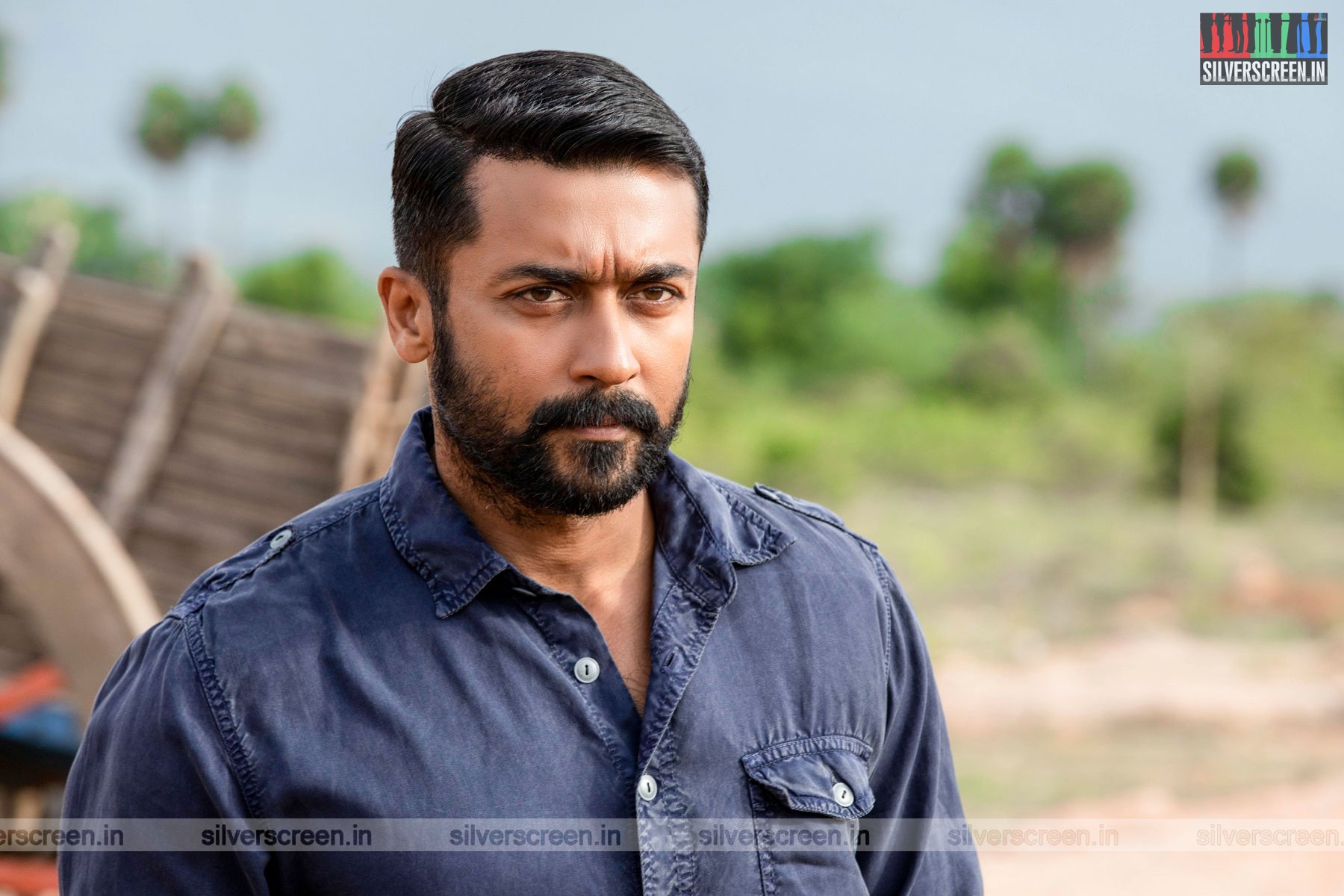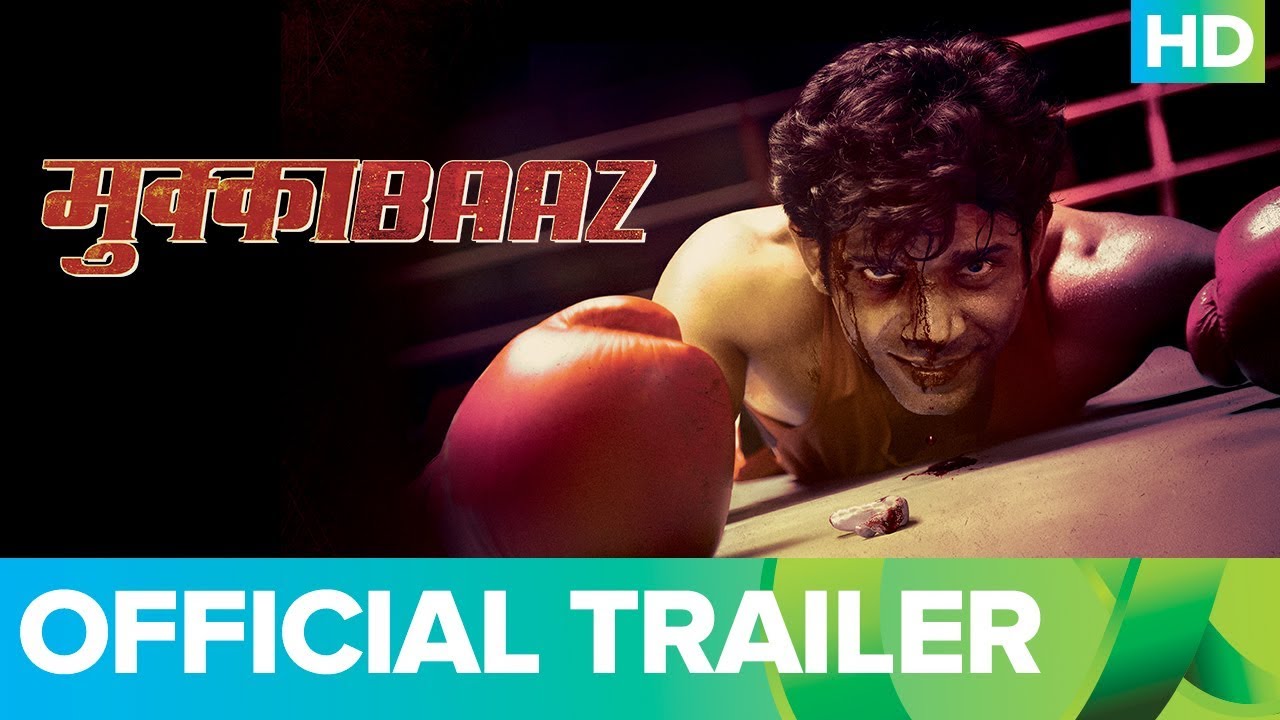Suneel Raghavendra’s debut film Puta Tirugisi Nodi (Please Turn Over) has won the Special Jury Award at the 8th Bangalore International Film Festival. The film explores the age-old notions of love and relationships in a refreshing new way that puts a spin on questions of caste and patriarchy within urban modernity. With cricket making up the background (the climax scene is in fact inspired by a legend from Ranji’s life – which only a cricket aficionado can relate to), and music that is catchy while replete with classical literature, the film uses all the elements of ‘mainstream’ cinema and reinvents it into a fresh new aesthetic of story-telling.
As it awaits a theatrical release, Suneel talks to Silverscreen.in about his film, his life, the Kannada film industry, the increasing aggression in our lives and the complex and layered nature of being modern.
Suneel’s well-appointed study has a cushion that reads: Angry. Liberal. Feminist. Killjoy. That should cushion what’s to follow.
*****
When I meet him at his home – that also doubles up as his office – he is engrossed in his phone, using both hands to type out what looks like an intense comment. “I’m typing a takedown of a friend’s Facebook comments on the Udta Punjab issue. It’s full of expletives and there’s a chance we might not be friends after this,” he says.
Suneel’s love for cinema began when he must have been 3 years old and was forced to stay home due to frequent illnesses. “Even as a child, I found myself gravitating more towards Kannada cinema. Shankar Nag, Jaggesh, Kalpana were the stars whose work stoked my passion to create. This is what motivates me to make films rooted in the Kannada milieu. I want to make movies accessible to people here, and write their stories as opposed to creating films that have no bearing at all to the problems faced by the typical Kannadiga.”
Armed with a diploma in filmmaking from Prague, Suneel worked on short films and assisted bigwigs such as B Suresha of Puttakkana Highway fame, and Prakash Raj. His first film, Puta Tirugisi Nodi (PTN) was unveiled at the Bengaluru International Film Festival this year, and garnered much acclaim, eventually netting the Special Jury Award. A two-hour long labour of love, the film is the perfect vehicle for its creator’s opinions on caste, secularism, and on the complicated lives of modern Indians.
Of particular significance is the gorgeous music by Dheerendra Doss. The film’s soundtrack boasts a Da Ra Bendre poem, ‘Yaarigu Helonu Byaada’ (let’s not tell anyone) among others, and fuses old world music with new age beats. “My childhood was rooted in proper Carnatic music. My parents have an auditorium inside our house, and I remember many an evening spent listening to the concerts held there. That had a huge influence on me. As I grew up, Jazz became my favourite. I’m very happy that my first film has both of these forms of music.”
Suneel feels very strongly about actors lip-syncing to songs.”If actors are going to lip sync to songs in a film, then it has to be sung by them. I grew up watching all these American musicals. For me, a musical means the actor being able to perform the music too. I think in comparison, Indian actors now have very little to do than their American counterparts. It’s a sentiment that got lost with the sixties, I think,” he says. PTN’s heroine Aditi Kalkunte has rendered two songs in the film. “Initially, it was not a part of the script at all. Once Aditi came into the picture, we added that aspect to it. If my actors can’t sing, then I’m won’t force them. But if they can, then why the hell not let them?”
*****
Bangalore’s parks and green spaces fell victim to the city’s rampant urbanisation. As a result, the city’s kids have no place to play – an issue Suneel wanted to address in his film. PTN foregrounds two teams fighting over a local playground. The protagonist, played by Kailash T V, tries hard to instill a sense of fair play and discipline into his young team, while the rival group indulges in aggression. “There is no concept of a ‘neighbourhood ground’ these days. The older areas have it, but the newer, peripheral ones don’t. I was speaking to the coach of a woman’s cricket team, recently. There’s a massive play area on the outskirts of the city. Football on one side, cricket nets on one side, a skating rink. It has everything. And in that playground, there are girls playing cricket. It’s a public ground. And the coaches said that if a girl ’s straight drive hits a boy, they come over and intimidate the girls. It’s clearly a caste and gender issue. It’s unfortunate that such a thing is happening for either person. Of course, their violence and aggression comes from their own sense of misogyny and sense of privilege and ownership of the ground. But the conflict itself is happening because of the lack of space. The issues of inequality and disparity come to the forefront when people have to fight for resources,” he says.
Apart from making this issue a large part of his film, Suneel is also working hard to bring about some change. “I have been working with a friend who’s an urban planner, to propose that the whole of Palace Grounds area be converted into a big park. But I don’t think it will materialise. We live in a time and place where people think of environmentalism as ‘anti-prosperity’. They think that it somehow takes away their capacity to earning. These are all completely confused concepts. It is a combination of ignorance and arrogance that the middle class has. On the one hand, we don’t know anything and on the other, we’re so full of ourselves that we are not willing to learn. It’s a deadly combination. That’s why you have people so confidently saying “… of course, you have to clear forests for industries, otherwise how will development happen?” According to the latest statistics, only 4.5% of our country is covered by forests. And people want to reduce it further. And then we complain if leopards come into our schools. What do you expect, right?”
*****
Suneel drew inspiration for several of the film’s characters from the lives of people he knew – including his own. He also wanted to highlight our blind adherence to bygone rituals. “Nothing comes from a vacuum. My heroine’s mother leaves behind a marriage because her husband and his family did not want a female child. There are people in this century who would physically roll around temples while pregnant in some kind of arcane ritual just so to ensure that the baby would be a boy. Such beliefs are entrenched in our society – and they go unquestioned.”
There’s a flipside to this too. “On the other hand, I know people who were quite miffed when they didn’t have daughters. It’s a mixed-up world. People have a very monolithic understanding of what patriarchy is or what gender preference is. It’s very complicated. Some people prefer daughters because ‘she would be a softie and I can pamper her’. It’s not a simple binary. It’s very murky.”
The heroine’s mother, played by Sudha Belawadi, though extremely liberal, behaves a little out of character in some scenes. “Here’s a woman who’s broken out of her bonds, and yet she’s being very patriarchal when she decides what her daughter can and can’t do. And that’s a conflict I wanted to present in the sense that even the best of us, the most liberal of us can go into a shell and feel very protective of the people we care about. As much as we think we are liberal, if one of the women of our house steps out of the house late at night, we still have a moment of panic. And you don’t want to be condescending… patronizing. But it’s hard… so hard. Even if you give me ten days to come up with a politically correct response to things like this, I wouldn’t be able to do so. This is the struggle that modern Indians like us are going through.”
*****
Over the past year, Suneel has moved out of his Malleswaram home and is about to get a divorce. He has also started a consultancy wing in his production company Talent’s Day Films to help aspiring filmmakers. “There’s a lot of film related material online and I wanted to make it accessible to all. So I’ve enlisted the help of professionals to do this project. As I wait for the film’s release, I figured that it would be a good use of my time to serve as a guide to people still looking for a foothold in the industry.”
In Suneel’s film, the hero, a promising cricketer, leaves his sporting career behind to become a Kannada teacher. In a country which highly values its cricketer, here is a man who turns his back on the sport to find fulfillment in the kind of position that is not as glamourous. Yet he doesn’t dwell much on it, preferring instead to concentrate on the present. That’s a unique human thing to do – and a heroic one at that.”Every second person I know has moved on from something big in his or her life. We underrate our own achievements by throwing our lot with the ‘gods’. While distributing credit among the many deities in our country, we forget to credit ourselves for the effort we put into our lives. I wanted to show the individual’s efforts. Anybody who’s gotten past an abortion, a breakup… we’re all heroes in that way. That is what I wanted to celebrate. There are normal people in this world, with extraordinary stories and capabilities. These are the ones I wanted to talk about.”
And this is something he feels strongly about. Suneel went through a ‘nightmarish’ experience to get an Engineering degree before he left it behind to make films. “For a brief period, I was a ‘good boy doing engineering’. Why? Because someone else was paying the fees, I had no say in it. To a large extent, I feel the older generation does not realise what they put aside. That is why they don’t recognize their children’s dreams. For them, it was a question of survival. My mother wanted to be a dancer but couldn’t because she couldn’t afford to buy salangai (musical anklets worn by classical dancers). I dreamt of making films since I was 3 and engineering was a nightmare for me. I had friends and experiences to ease my way through it, but the idea that I could never make films was difficult. But thankfully, here I am, one film old. If I’d known this was what awaited me at the end of the engineering tunnel, I’d have tried to be a little less glum about it,” he grins.
Suneel recently moved into a new home in a place where two different kinds of worlds meet – staid Malleswaram with its old-world morality and the more hip Cantonment area. Despite its popular onscreen portrayal, Bangalore is more conservative than ever, insists Suneel. “I’ve been frowned upon ever since I got here. You can almost hear their thoughts ‘…unmarried guy walking around sporting a beard, ‘ quote, unquote, Bachelor”. All these terminologies one uses; you see a resistance in it – resistance to ‘this guy who’s not like us’. And I think it’s there throughout Bangalore.”
His problem is not with what people think, but rather with what people choose to worry about. A motif he uses to great effect in PTN is that of a man labouring to score his century at cricket, while sweeping his relationship troubles under the carpet. It is human nature to do so, he tells me. “I find that people pursue the worst things. People are pursuing the century as opposed to more important things like intolerance. They keep their heads under the sand, content to police other things than wake up to reality.”
Suneel grew up in a Bangalore that had Cauvery riots. The intolerance issue has been there ‘forever’, he says and people tend to ignore it. “I have seen buses on fire and stones being thrown, in Malleswaram. Every time I walk to a bus stand near a playground, somebody is fighting with each other. Over a playground of all things.”
He thinks it is important to highlight issues of violence in films so that people take note. “Here, people would rather moralise on a wide variety of topics than do something about more concrete issues. They don’t care about men fighting on the street. But if two people are holding hands, it’s suddenly a big issue! I want to shame that instead. Shame violence. Shame the man who beats his wife, Shame the people who fight on the roads. Shame that instead of love.”
*****
The Kannada Industry, Suneel says, is a ‘clannish, feudal setup where nothing changes ever’. “There has always been a lot of noise about capping ticket prices, but it hasn’t amounted to much yet. All the theatres here, barring a small minority, are multiplex chains owned by people from outside the state. None of them have any moral duty towards the language or the state – and you can’t expect them to. The Tamil industry is sufficiently big enough to bully these chains to keep the ticket prices low. But our industry is still small.”
The only way out is to change the system from the bottom up, he insists. “On the one hand, you have producers who face issues from distributors. But you can’t change them because there are some producers who are distributors themselves. Now from the point of view of the distributors, you can’t get adequate screens and stuff. So if you’re trying to arm twist them, then there are some of those distributors who are exhibitors themselves. So one has to really get down and dirty and change things from the bottom.”
There’s also a clear lack of diversity in Kannada cinema, feels Suneel. “At the end of the day, if you’re still setting a film in Bangalore, then there’s nothing new there. You’ve got stereotypes of villagers in urban films… and then an urban character is taken to non-urban settings. These comedy-of-errors sort of films… these are old motifs, the sort that Bhagyaraj and Ravichandran used to do.”
Recommended
Filmmakers should just go out there and make films they believe in, he says. “We haven’t had women filmmakers. I may come across as ‘sickular’ now,” he says, mocking himself with the derogatory term used by the ultra conservative to express their disdain for the ‘secular,’ “but we haven’t’ had Kannada Muslim storytellers, Kodava directors writing Kodava stories etc. There’s a lot of tokenism at play here. There are subsidies awarded for Kodava films, for Tulu films. We need a Marathi-Kannada film, a Telugu-Dakhini film out of Raichur. We need those stories to be told and done. I think Ulidavaru Kandanthe was a big step in that direction. ”
Ideally, Suneel would next like to create a character like Muhammad Ali in an Indian setup. “But we haven’t had anybody like that. The system has been so successful in keeping people down that that we haven’t had one successful boxer in Ali’s mould at all. Not even one in about 1.3 billion people. How crazy is that!”
My eyes wander back to the cushion. Angry, Liberal, Feminist, Killjoy. “I’m sure that’s four reasons why I’m not really good company,” Suneel chuckles good-naturedly. One is compelled to disagree as the fourth reason doesn’t hold – thanks to the other three.



